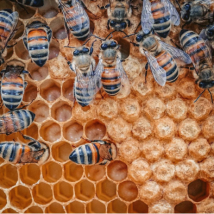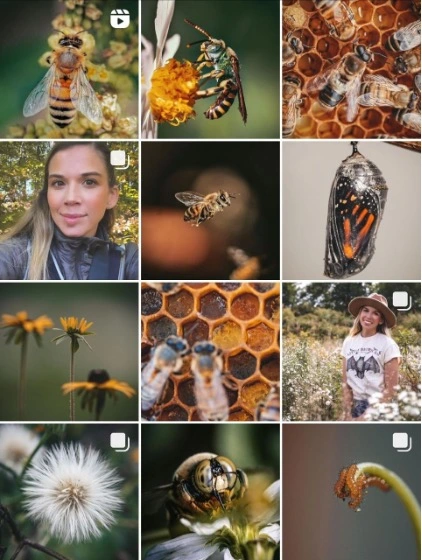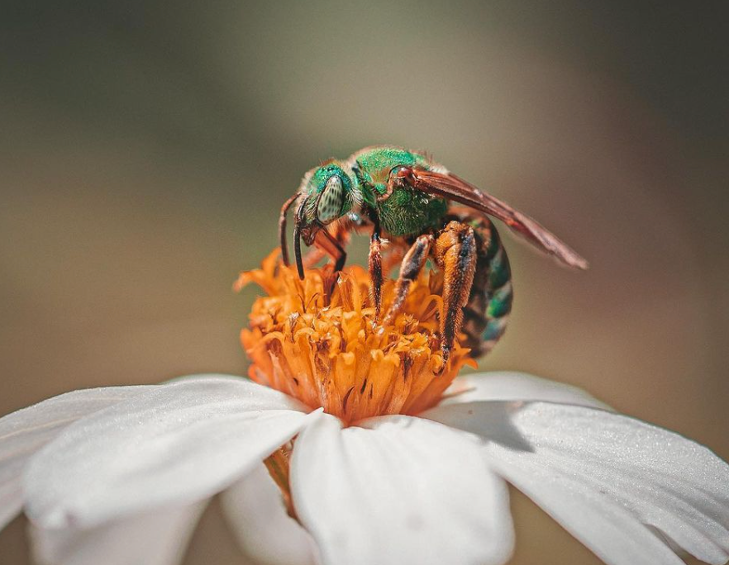Hannah Alexander is an American beekeeper, horticulturist and photographer. She runs the Instagram account Hannah’s honeycomb to share the stories of these often-overlooked creatures through eye-catching photography. Now that more and more native bees and other pollinators are going extinct, nature influencers like Hannah, who make it their mission to share the beauty of pollinators and educate their audience, are crucial. Let’s find out more about Hannah’s social media journey, photography and, of course, beekeeping.
LVC: Why and how did you start your social media account?
HA: I started it when I began beekeeping, because I was learning so many amazing things that I thought people should know. I wanted to share those things, so I started off with some iPhone photography and writing. I got more and more into photography because I wanted to have visuals to go with the writing. When I began with photography I wasn’t really any good, so I would just talk about whatever body part I had managed to get into focus: if the legs were in focus I would write about the legs. In the beginning, my account was just biology facts about whatever I managed to photograph and I let it evolve from there.
“So many people just walk right by bees and insects, they don’t even notice them. I just want people to notice them more. I think that you protect what you notice and what you care about, and so many people just let their eyes glance right over such beautiful things.”
LVC: How and when did you get into photography? Was it at the beginning of your beekeeping journey or was it before you graduated with your biology degree?
HA: (Enthusiastically) I already enjoyed photography a little bit before I began beekeeping. For a very long time, I took pictures with an iPhone before I invested in a camera. I tried to learn as much as I could. I really enjoyed photography and it became something that came easily to me. (pause) It was really fun to combine the world of photography and beekeeping.

LVC: How did you learn skills related to social media?
HA: (Enthusiastically) When I started off, I took an e-course with someone who was a fashion influencer. I first tried to do what fashion influencers did and think about how I could tailor that to my content. That’s how I learned about branding and learned to pick brand colours, among other things. As for photography, I taught myself how to edit so my pictures would look like they were taken with a camera. That was in the beginning of my social media journey, when I still captured my photos with an Iphone.
But, aspects like aesthetics and how your Instagram grid looks mattered more a few years ago than they do now. I would say that now audiences want authenticity, and they want to see reels. People are over that perfect lifestyle and want to get relatable and valuable content. It’s definitely interesting to have seen the trends evolve over the last couple of years.
LVC: What did the growth of your audience look like?
HA: I started my account in 2018 and at that point, it was quite easy to grow just by posting a bee fact every day. My account grew pretty consistently during the first couple of years. That was really satisfying, and it helped to keep the motivation going. Now, it’s a little bit harder in some ways to start but it’s also an interesting time because there is so much potential. Social media is about being yourself, people want to see you being you.
When my audience grew, I realized the number of followers doesn’t matter that much. I still received similar opportunities from a much smaller audience. In some ways, not many things change when your audience grows. It really depends on who’s seeing your content and who you’re connecting with. Actual connections matter more than numbers.
But I also did have some difficulties when I started my account. In the beginning, I niched down a bit too much by only posting about biology. When I tried to diversify because I wanted to talk about other things that mattered to me too, I definitely received pushback from my audience, so I wouldn’t recommend niching down as much as I did.
“Even if you can’t personally plant a whole field of native plants, you never know who you’re talking to who might be able to do so. So, it’s worth talking about doing what you can with what you have.”
LVC: You have a clear message, protecting pollinators, and you’re very passionate about that. Through eco-education you spread awareness about tiny creatures like caterpillars, bats, and bees and other insects, all of which are essential for our ecosystem. Do you consider that your life’s work?
HA: (Passionately) Yes, pollinators are a big part of it, but for me, the joy is in finding those small connections in nature. I love the pollinators because I love animals and wildlife of all kinds, but I feel there’s something beautiful with the flowers and insects and how accessible they are. You don’t need to be somebody that can travel the world to find them. Anybody can go in their backyard and find these insects and enjoy them and support them. It doesn’t matter how much land you have, it doesn’t matter if you have a car or not. You can find a small spot and find flowers and bees and plant something for them. It’s a very tangible way in which anybody can be involved.
LVC: That’s really beautiful! I had pets when I was a kid, but I don’t have pets anymore and sometimes I miss them. But I have a little balcony and there were a lot of bees in Spring and I found it so cute to see them go back and forth, being buzzy. It felt like I had pets again. HA: (Happy) Exactly! It’s always very grounding for me to find them. I enjoy being somewhere and seeing the bees. It brings you back to nature wherever you are. So many people just walk right by bees and insects, they don’t even notice them. I just want people to notice them more. I think that you protect what you notice and what you care about, and so many people just let their eyes glance right over such beautiful things.

LVC: Many people fear bees and insects. As a biologist and beekeeper, how do you react to that?
HA: I try to be open-minded and try to explain that the bees they see out on the flowers are not the ones that are going to sting you. It’s very rare to get stung unless you’re by their nests disturbing them. If you don’t swat them, they will leave you alone. On top of that, I name some fruits and foods that we rely on. Do you eat apples? We all need bees for that. Or do you drink almond milk? We also need bees for that! For so many things around us, we rely on pollinators. There’re so many people who don’t even notice them but they’re a really big part of our ecosystem. Besides, I also explain what they’re doing when I see them. I think a lot of the fear around insects comes from not understanding them because we don’t learn that much about them in school. In my opinion, there would be a lot less fear if their movements were understood and didn’t seem so unpredictable. When you know a bee is just flying by, things will be just fine, it’s not going to attack you.
LVC: What do you think about beekeeping for honey? Is that detrimental to the bees?
HA: That really varies based on the colony itself. Personally, I don’t sell honey but there are times when my hives are overproducing. The bees will keep storing honey all summer long, even past what they need and then I have to add boxes. I’ll overwinter my hives in two deep boxes because any more than that is too big for them to be able to keep warm. So if they build boxes above that, I will harvest that honey.
I don’t necessarily trust other people to make the same judgement. Different people have different priorities when it comes to harvesting honey. If there is excess, I consider it a beautiful gift from the bees and I really treasure that. I give the honey from my hive to family and friends, but I would never sell it since it’s too precious for me. However, I think that selling honey can be done ethically. You just need to know and trust who you’re getting the honey from and be sure that they’re doing it the right way!

LVC: There is a growing awareness that native bees are going extinct. However, there is still a lot that can be done by each of us. What is something we all can do to help pollinators?
HA: Try to plant flowers that are native to your area. It’s also a good idea to limit how much you rake up and throw out leaves because there’re a lot of pollinators that live and overwinter in nests in the leaves. Plants aside, if you choose to buy honey, support beekeepers who use ethical practices, such as not taking honey the bees need in order to feed themselves. What also helps a lot is just spreading the word as much as you can to the people you know so they notice bees more. In my opinion, the more people talk about it, the more people will become aware of the importance of pollinators for our ecosystem and the survival of the human species. You never know who’s listening and what impact that could have. Even if you can’t personally plant a whole field of native plants, you never know who you’re talking to who might be able to do so. So, it’s worth talking about doing what you can with what you have.
